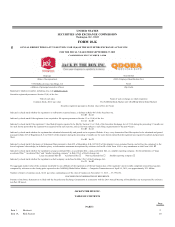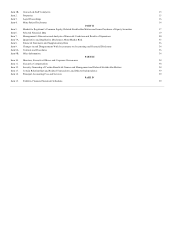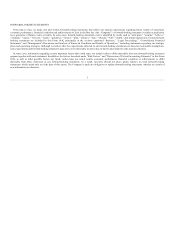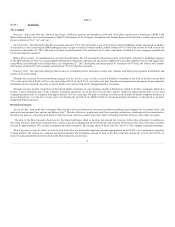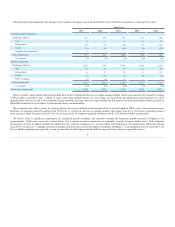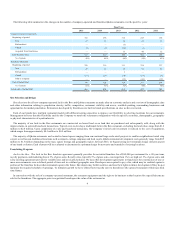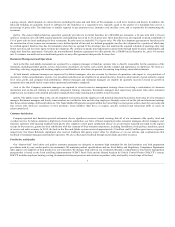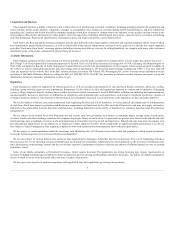Jack In The Box 2015 Annual Report Download - page 7
Download and view the complete annual report
Please find page 7 of the 2015 Jack In The Box annual report below. You can navigate through the pages in the report by either clicking on the pages listed below, or by using the keyword search tool below to find specific information within the annual report.
a going concern, which depends on various factors, including the sales and cash flows of the restaurant, as well as its location and history. In addition, the
land and building are generally leased or subleased to the franchisee at a negotiated rent, typically equal to the greater of a minimum base rent or a
percentage of gross sales. The franchisee is usually required to pay property taxes, insurance and ancillary costs, and is responsible for maintaining the
restaurant.
Qdoba. The current Qdoba franchise agreement generally provides for an initial franchise fee of $30,000 per restaurant, a 10-year term with a 10-year
option to extend at a fee of $5,000, royalty payments, and marketing fees of up to 2% of gross sales. Most franchisees are also required to spend a minimum of
1% of gross sales on local marketing for their restaurants. Royalty rates are typically 5% of gross sales. We offer development agreements to franchisees for
the construction of one or more new restaurants over a defined period of time and in a defined geographic area for a development fee, a portion of which may
be credited against franchise fees due for restaurants when they are opened. If the developer does not maintain the required schedule of openings, they may
forfeit such fees and lose their rights to future development. We continue to pursue non-traditional locations both through multi-location commitments and
single unit franchise agreements. Currently, the non-traditional franchise agreements we offer provide for a $30,000 initial franchise fee, and a 6% royalty
rate. To enhance our multi unit non-traditional growth, we may offer agreements that provide for lower fees.
Jack in the Box and Qdoba restaurants are operated by a company manager or franchise operator who is directly responsible for the operations of the
restaurant, including product quality, service, food safety, cleanliness, inventory, cash control and the conduct and appearance of employees. We focus on
attracting, selecting, engaging and retaining employees and franchisees who share our passion for creating long-lasting, successful restaurants.
At both brands, restaurant managers are supervised by district managers, who are overseen by directors of operations, who report to vice presidents of
operations. Under our performance system, vice presidents and directors are eligible for an annual incentive based on achievement of goals related to region
level sales, profit, and company-wide performance. District managers and restaurant managers are eligible for quarterly incentives based on growth in
restaurant sales and profit and/or certain other operational performance standards.
Jack in the Box. Company restaurant managers are required to attend extensive management training classes involving a combination of classroom
instruction and on-the-job training in specially designated training restaurants. Restaurant managers and supervisory personnel train other restaurant
employees in accordance with detailed procedures and guidelines using training aids available at each location.
Qdoba. The Qdoba Career Map is the core development tool used to provide employees with detailed education by position, from entry level to restaurant
manager. Restaurant managers and hourly team members are certified to train and develop employees through a series of on-the-job and classroom trainings
that focus on knowledge, skills and behaviors. The Team Member Progression program within the Career Map tool recognizes achievement for our cooks and
line servers who showcase excellence in their positions. Team members must have, or acquire, specific technical and behavioral skills to reach an
achievement level.
Company-operated and franchise-operated restaurants devote significant resources toward ensuring that all of our restaurants offer quality food and
excellent service. To help us maintain a high level of customer satisfaction, our Voice of Guest program provides restaurant managers, district managers, and
franchise operators with ongoing feedback from guests who complete a short guest satisfaction survey via an invitation typically provided on the register
receipt. In these surveys, guests rate their satisfaction with key elements of their restaurant experience, including friendliness, food quality, cleanliness, speed
of service and order accuracy. In 2015, the Jack in the Box and Qdoba systems received approximately 2.0 million and 0.2 million guest survey responses,
respectively. Our Guest Relations department also receives feedback that guests report either by telephone or via our website, and communicates that
feedback to restaurant managers and franchise operators. We also collect guest feedback through social media and other resources.
Our “farm-to-fork” food safety and quality assurance programs are designed to maintain high standards for the food products and food preparation
procedures used by our vendors and in our restaurants. We maintain product specifications and our Food Safety and Regulatory Compliance Department
must approve all suppliers of food products to our restaurants. We manage food safety in our restaurants through a comprehensive food safety management
program that is based on the Food and Drug Administration (“FDA”) Food Code and the Hazard Analysis & Critical Control Points (“HACCP”) system.
HACCP includes employee training, testing, documented restaurant practices and attention to product safety and quality at each stage of the food
5

